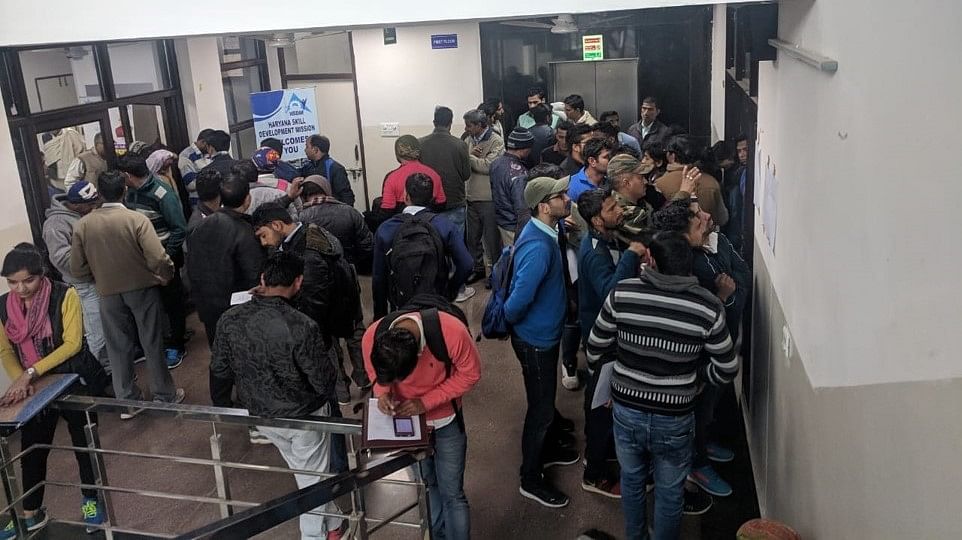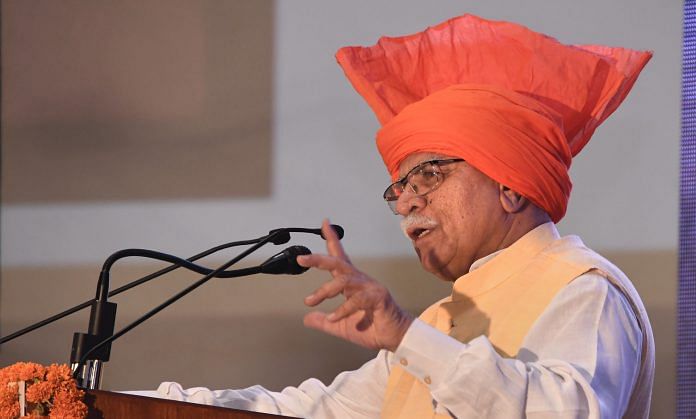From Railways to state departments to schools, the number of people who apply for government jobs in India as well as the high number of vacancies is always staggering and a testament to the enduring fascination for public sector jobs across the country.
The high demand coupled with an inefficient recruitment process has become evident in several government job-related scams in different parts of the country. The Vyapam scam in Madhya Pradesh, a 10-year jail sentence to former Haryana CM O.P. Chautala for the teacher recruitment scam, and the Uttar Pradesh police recruitment scam a decade ago are some examples.
Over the last two years, the Manohar Lal Khattar government of Haryana has been working to streamline its recruitment processes. It has shown promising results. Government posts pending for 15 years were filled up in months.
Also read: No job crisis? 7,000 apply for 13 Maharashtra Govt waiters’ jobs, 12 graduates selected
The recruiting problem
The allure of government jobs is easy to understand – ‘security’, salary and pension benefits, perceived ‘respectability’, and the lack of requisite training and qualifications to secure private jobs.
In Bihar, about 5 lakh people applied for 166 posts to work as peons, gardeners, gatekeepers and cleaners in the Bihar Vidhan Sabha. As on 1 March 2018, of the 38.02 lakh total sanctioned posts in the central government, 31.18 lakh were filled, resulting in nearly 17 per cent vacancy.
The bulk of the recruitment for state government jobs is usually carried out by a semi-autonomous agency called the staff services/selection commission (the name varies across states). Government departments looking to recruit usually contact the commission to conduct a recruitment drive.
The drawbacks in the recruitment process range from lack of capacity within the commission to an arduous approval process that is mostly manual and time-consuming.
An overarching problem is the lack of transparency that results in a multitude of court cases and subsequent stay orders stalling recruitment. In Andhra Pradesh, the High Court stayed the release of results for the Andhra Pradesh Public Services Commission exam by more than a month. This meant an already delayed process went further off schedule for more than 60,000 candidates, because two candidates filed a petition regarding a procedural lapse. Some years ago, the Supreme Court stayed the recruitment of thousands of aspirants for primary teaching jobs in Uttarakhand. The reason? A petition filed in the court claiming seniority rather than merit was being used as the criteria for recruitment.
The overwhelming clamour for government jobs has also made the process a fertile ground for corruption and manipulation.
While these problems are common across India, some states such as Haryana, Madhya Pradesh and Rajasthan have tried to solve them using different approaches. They have either done away with interviews, moved the application process online, or streamlined the organisation structure of the recruitment body allowing for better delegation and implementation.

Also read: Manohar Lal Khattar — the BJP dark horse who cost the party its Haryana edge
Haryana’s solution
Starting in 2017, the Manohar Lal Khattar government of Haryana, in particular, initiated efforts to streamline government recruitment, especially for Group D staff.
Group D staff are found in every government office and are critical to keeping these offices running. They are the sweepers, peons, lift operators, plumbers, typists, mess workers, gardeners, and so on. The state introduced policy, process and structural reforms to make their recruitment process simple, transparent and efficient.
On the policy front, the government scrapped interviews for candidates. The nature of Group D jobs is such that an interview is an unnecessary and time-consuming step. Interviews also leave room for discretion and bias. Now, recruitment for these jobs in Haryana is conducted on the basis of only an exam.
All departments across the state require Group D personnel. The nature of work doesn’t vary depending on the department that needs them. However, it is not uncommon to find each department having its own set of rules for recruitment in terms of eligibility criteria and minimum qualifications. This is another bottleneck that slows down the overall recruitment process.
To this end, the government of Haryana developed uniform service rules for recruitment of Group D personnel. In practical terms, it meant applicants for all Group D jobs sit for the same exam across the state. And these exams are common across posts as well. These changes were instituted through the Haryana Group D Employees Amendment Bill, 2019 passed in the state assembly.
In terms of process, the government overhauled the mechanism through which different departments conveyed their staff requirements to the Staff Selection Commission (SSC). Instead of a paper-based process that would require multiple approvals, an online requisition mechanism was created. The departments and SSC now have complete visibility on sanctioned posts, vacancies and requirements.
And finally, the document verification process was changed to make it more efficient. Earlier, 10 per cent applicants had to physically verify their documents, even before they appeared for the recruitment exam. The state switched to an online self-declared verification process, wherein candidates could upload their documents online. And only those candidates who successfully clear the exam and are recommended for a position, have to now get their documents physically verified. It was much more time-efficient.
Also read: For 2 years from 2014, Indian graduates became more employable. Then their growth stagnated
Result of government efficiency
The result of these reforms is that in early 2019, the government of Haryana successfully concluded a recruitment drive for nearly 18,000 Group D posts across 74 departments within six months, the single largest recruitment drive in the state, something pending for more than 15 years. Nearly 18 lakh people applied for these posts.
To put these numbers in perspective, there are less than 50 lakh families in Haryana, which means one person from every third family applied for a government job. Overall, since instituting these reforms, the state has been able to recruit around 45,000 candidates in a period of 18 months as opposed to around 75,000 over 13 years. The ongoing effort now is to further streamline the process and build the capacity of the SSC.
While it can’t be denied that the long-term solution to the employment crisis rests with the private sector, the public sector can ease the job distress to a large extent by streamlining its recruitment process.
Gaurav Goel is the Founder & CEO of Samagra | Transforming Governance, a mission-driven governance consulting firm. Samagra is working with the Government of Haryana multiple governance reforms. Views are personal.
This is the first in a four-part ThePrint-Samagra series that delves into complex governance challenges facing India and how they are being solved.




Unemployment rising
No arguing with this surmise. The current dispensation’s economic record is bad. If it goes on in the current fashion, this government will join VP Singh’s government as arguably amongst the worst in independent India’s history. Serious attention to the economy is needed to avoid potential catastrophe, effects of which maybe felt for generations. Good sense needs to prevail on everyone who has the ability to influence this dispensation to correct course now. No point in locking the stables once the horses have bolted.
Well done Kattarji this is the way to go